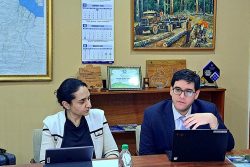Months after meeting with Attorney General and Minister of Legal Affairs Anil Nandlall, the Opposition-nominated Commis-sioners on the Guyana Elections Commission (GECOM) have tabled a motion calling for the introduction of biometrics as part of the electoral reform process.
The motion was laid by Com-missioners Vincent Alexander, Charles Corbin and Desmond Trotman when the Elections Commission met on Tuesday. It will possibly come up for discussion next Tuesday when the Commission meets again.
The motion states that there have been numerous allegations of voter impersonation at places of poll, adding that in 2020 GECOM was provided with documentation from statutory agencies and bodies to substantiate the allegations. It argued that GECOM has discussed the introduction of a biometric identification system at the place of poll as an additional mechanism for enhancing the system of identifying voters on election day and such a feature will significantly impact and improve the overall systems by reducing the number of successful instances of voter impersonation.
The Opposition Commission-ers added that GECOM is of the view that, operationally, the introduction of a biometric identification system at the place of poll should be preceded by the implementation of a digital registration system which includes the digital capture of registrants’ biometric characteristics at its permanent registration offices. It reminded that the Commission had decided to conduct a study on the implementation of biometric systems.
The motion pointed out that during the discussions the view was expressed and doubt created as to whether GECOM could proceed to implement these systems without specific legislative intervention.
It also highlighted the fact that the government has initiated a process to commence the reform of Guyana’s electoral laws and invited inputs from the Commission.
“Be It Resolved that GECOM recommends to Government that in the process of its legislative reform of the national electoral systems it takes these GECOM considerations into account, so that if existing legislation does not or cannot accommodate a positive decision on GECOM’s part to implement its proposals, then it should make the appropriate legislative provisions to so facilitate
“And Be It Further Resolved that GECOM officially inform all parliamentary parties of its current considerations and decisions in relation to the introduction of a biometric identification system at the place of poll and the digital registration system, which includes the digital capture of biometric features, at its permanent offices,” the motion concluded.
Back in May, the Chair and Commissioners of GECOM met with Nandlall to discuss the proposed amendments to the Repre-sentation of the People Act (RoPA).
Chair, retired Justice Claudette Singh led the delegation that consisted of Commissioners Sase Gunraj, the late Bibi Shadick, Manoj Narayan, Alexander, Corbin and Trotman. Justice Singh had made several submissions to the Ministry of Parlia-mentary Affairs and the Attorney General’s Chambers which are spearheading the process.
The draft amendments were released in November last year and since then the government has been accepting submissions from the public on the proposed changes. Thus far, it has received a number of those submissions and GECOM’s is said to be among the most substantive.
Among the submissions, the GECOM Chair made was the call for the consolidation of the electoral laws as well as amendments to allow for the Chief Election Officer to furnish the Commis-sion with copies of the State-ments of Poll (SOPs) to aid it in the declaration and publication of the final results.
Following that meeting, Alexander had told Stabroek News that the meeting with the Attorney General lacked substance since it is premised on submissions that did not come from the full Commission.
This motion, now, is part of the Opposition’s proposal on the amendments to the electoral laws. The employment of biometric technologies has been consistently raised by Alexander but to date, the Commission has not made a decision on it.
The government has said that it will be amending the National Registration Act along with RoPA but to date has not released any word of when that process would be completed.
The draft amendments are a result of the attempts to rig the March 2 2020 general and regional elections, which saw a five-month delay between balloting and the declaration of the final results.
As a consequence of the events of the March 2020 elections, several former GECOM officials, including Chief Election Officer (CEO) Keith Lowenfield, Deputy CEO Roxanne Myers, and Region Four Returning Officer Clairmont Mingo, and political party officials were charged with election-related offences.
One of the major changes the government proposes is the division of Region Four, the country’s largest electoral district, into four sub-districts – East Bank Demerara, East Coast Demerara, North Georgetown and South Georgetown – effectively adding a new section to Section 6 of RoPA, which deals with polling districts and divisions.
Among the proposed amendments are the introduction of hefty fines and lengthy jail time for several election-related offences. The fines are in the millions while jail time ranges from three years to life.










